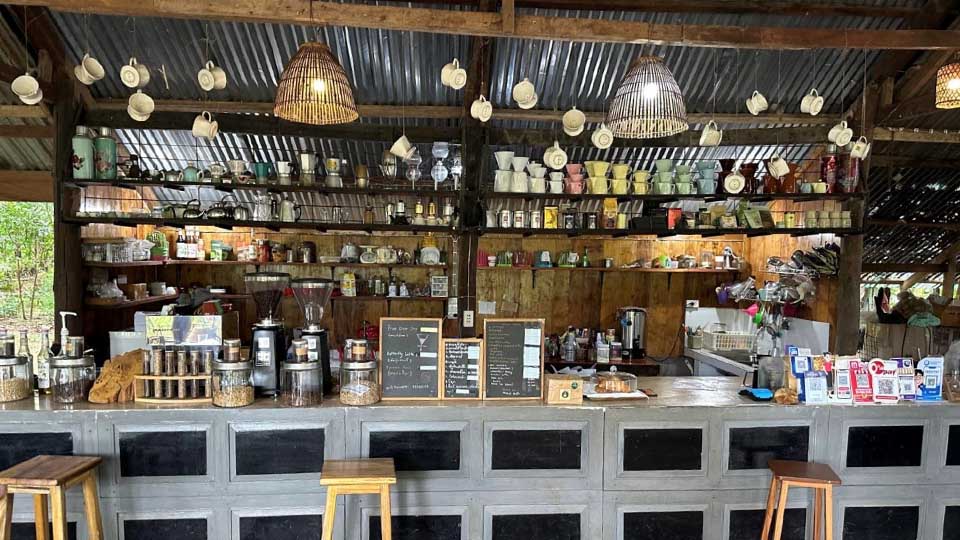Loukoumi Geroskipou, Cyprus
Sometime in the 1700s, a new confection started to become popular in the Middle East and Mediterranean regions. While the specific source of the first recipe still remains unclear (Turkish Journal of Agriculture and Forestry, 2014), the sweet is estimated to have originated in the Republic of Turkey (Turkey) in the 14th and 15th centuries under the name lokum (according to a 2009 study by faculty at the Food Engineering Department of Tunceli University). Traditionally made of sugar, corn flour, starch, water, nuts, and flavorings such as rose water, the soft, chewy, and sugarcoated cubes became popular in England in the nineteenth century after they were imported under the name Turkish Delight by an unknown British tourist (Turkish Journal of Agriculture and Forestry, 2014). At the same time, the delicacy was also reaching other countries such as Greece, Romania, and Lebanon, absorbing into these countries' culinary cultures.

As lokum was introduced in many countries in neighboring regions it was modified to local tastes and customs. In the Republic of Cyprus (Cyprus) it is known as loukoumi and has been a popular traditional dish since it was introduced to the country in the late nineteenth century. In the town of Geroskipou in the southwest region of Cyprus, one family – operating a small and medium-sized enterprise (SME) under the Aphrodite Delights name – has been continuously making the confectionary since 1895 and is renowned for its loukoumi, becoming one of the region's most well known producers (Specialty Food Magazine, 2011). The registration of a protected geographical indication (PGI) in the European Union (EU) for loukoumi from Geroskipou in 2007 provided Aphrodite Delights and other local producers with a powerful tool for continued growth.
Traditional knowledge
From its creation, the production and regional expansion of loukoumi has relied on traditional knowledge. When Mr. Sophocles Athanasiou returned to Cyprus after traveling and living abroad for many years in the late 1800s, he passed through numerous islands in the Mediterranean Sea where the delicacy was being refined and produced by local confectionaries.
Well aware of the burgeoning popularity of lokum (the original Turkish variant) at the time in Europe, Mr. Athanasiou learned the secrets of how to make traditional loukoumi from these local pastry chefs. Returning to Cyprus with a recipe in hand, in 1895 the entrepreneur combined this traditional knowledge with business practices he also learned in his travels and opened up his own loukoumi shop near the town square in Geroskipou (according to Aphrodite Delights).
Over a century later, the traditional knowledge of loukoumi production that Mr. Athanasiou brought back with him to Cyprus has been passed down in his family from generation to generation. In a 2011 interview with Specialty Food Magazine, when asked about the importance of traditional knowledge the managing director of Aphrodite Delights, George Gabriel, said, “For us, it’s extremely important to maintain traditions going through the years. Keeping them ‘in the family’ ensures that the flavors that our ancestors developed are not forgotten.”
The ingredients and cooking method used to make loukoumi today are few and remain the same as when the dessert was first introduced in Cyprus (New York Times, 2005). Sugar, citric acid, and cornstarch are boiled and stirred in hot water and then cooled for a short time at room temperature. Flavorings including fruit aromas, rose water, or nuts (such as almonds) are added and then the mixture is poured into wooden boxes where it is left overnight to cool completely. This causes it to become gelatinous in consistency, although gelatin is not used in Loukoumi Geroskipou (Official Journal of the European Union, 2007). Once the desired consistency is reached, the confectionary is cut into small, bite-sized pieces and coated with caster sugar, making it ready to serve.

While the ingredients for loukoumi are common, great care must be taken throughout the cooking process, particularly with regards to heat application, cooling time, and the appropriate time for adding the flavoring ingredients. Making loukoumi is a time intensive process that requires patience and skill to maintain consistency and quality (according to Phini village in south-central Cyprus and producers in Geroskipou such as Aphrodite Delights). It is this traditional knowledge that has been used for over a century, has made Geroskipou Loukoumi one of Cyprus’ national dishes, and has allowed the delicacy to be competitive in international markets.
Goods with specific geographical origin
The geographical link that has resulted in the uniqueness of Loukoumi Geroskipou is not due to specific local environmental characteristics, but due to the historical traditions of loukoumi in the region (Official Journal of the European Union, 2007). Indeed, except the almonds and honey, which are produced in the nearby town of Paphos, the rest of the ingredients are industrial and not produced in Geroskipou.
Although loukoumi has a common set of ingredients, the taste, texture, and appearance of the dessert varies depending on the region in which it is produced. This is predominantly due to the production methods and ingredients that have evolved over generations in different ways. For example, the proportions of ingredients, stirring temperature and duration, and how many times the stirrer is turned all have a significant impact on the end result of the confection (Official Journal of the European Union, 2007). These ingredients and techniques vary by region and, even in the same locality, can vary by producer.
The evolution of different types of loukoumi has occurred due to geographical distances between confectionaries and production centers. In the case of Loukoumi Geroskipou (as Aphrodite Delights notes), the recipe and production methods have remained unchanged since the introduction of loukoumi to Cyprus in 1895. The dessert is prepared in such a way that yields a sweet gelatin-like dessert that his firm enough to retain its shape in room temperature, but has an elasticity that allows for it to melt when eaten. Furthermore, it has a reduced sweetness and, compared to many loukoumi or lokum from other regions in Cyprus and abroad, does not use any glucose or gelatin in its production. All of these factors give Loukoumi Geroskipou unique attributes that are due to the geographical location of the sweets' production.
Geographical indication
In 2003, Aphrodite Delights supported the registration in the EU of Geroskipou Loukoumi as a PGI. The application was accepted and in 2007 was registered as an official PGI in the EU. The PGI states that for a product to be called Loukoumi Geroskipou it must be produced within the boundaries of Geroskipou municipality and meet a specific method of production. The Cypriot Ministry of Agriculture (CMA) ensures that the geographic requirements are met by monitoring the production process and method, from mixing the initial ingredients to final packaging, which is enumerated in detail in the PGI.
This includes the quantities used of each ingredient, the temperatures at which the mixture is boiled, the precise moment in the process when each ingredient is added, and how the end product is cut and prepared for serving. It also includes a strict list of acceptable ingredients and quantities for different flavors such as rose, mint, lemon, and chocolate.
The PGI further clarifies the types of nuts that are acceptable to be added, and also sets out guidelines for cutting and packaging. For example, under the PGI all stages of production, including packaging, must be carried out in the producer’s facilities – which also must be located in Geroskipou municipality. This is due to the possibility of contamination from transporting unpackaged products and the risk that temperature fluctuations would alter the characteristics of the final product.

With the successful registration of the PGI, the decedents of Mr. Sophocles Athanasiou and the town of Geroskipou have successfully confirmed the link between the local region and one of the oldest continuously produced confectionary products in Cyprus (Official Journal of the European Union, 2007). Loukoumi Geroskipou has long been a popular attraction for residents and tourists alike, and the PGI has served to bolster this connection further. For example, George Gabriel of Aphrodite Delights went on to say in his interview with Specialty Food Magazine that the PGI “…has certainly garnered us more attention overseas, particularly in the UK where we export various varieties of the product for specialty stores to sell.”
Branding and domain names
Integral to the long-term success to the producers of Loukoumi Geroskipou is branding, which is enhanced by the PGI registration. While the Athanasiou family continues to market their confection as Aphrodite Delights, it has been traditionally known throughout Cyprus as Loukoumi Geroskipou (the PGI) or informally as Cyprus Delight outside the country. All of these names have served as an important tool for producers in the town of Geroskipou to draw attention to the unique brand of their regional variety of loukoumi (Pafos Regional Board of Tourism).
In the case of Aphrodite Delights, their name tends to signify the source of the confection in the region as the Athanasiou family has continuously run the SME. The Loukoumi Geroskipou name links together the town of Geroskipou with the sweet that it is known for and also provides customers with confidence that loukoumi produced in Geroskipou is made in the traditional, local manner (Official Journal of the European Union, 2007). Furthermore, whether the delicacy is called Aphrodite Delights, Cyprus Delight, or Loukoumi Geroskipou, all of these names bring with them a brand that has allowed regional producers to take advantage of the PGI, bringing their confection to customers throughout the world (Specialty Food Magazine, 2011).
The Internet has also served as an important tool for producers in Geroskipou to reach more markets, expand their brand, and build awareness of the PGI registration. A number of them have accordingly registered various domain names, with Aphrodite Delights owning aphroditedelights.com and loukoumigerskipou.com and a large cooperative of producers, Regena Farm, owning regenafarm.com.
Commercialization
Originally only sold in the small town of Geroskipou in the late nineteenth century, the confection's popularity quickly spread throughout Cyprus. Before the country's independence in 1960, loukoumi from Geroskipou was also exported to the United Kingdom and soon became a favorite dessert in the country and elsewhere in Europe. While other variants of the sweet (such as Turkish Delight) were perhaps more well known internationally during the early years of production, the town and producers were able to differentiate their products due to the unique qualities of loukoumi from Geroskipou. As a result, they were able to build up their own customer base, and the successful registration of the PGI has further helped in domestic and international commercialization efforts (Specialty Food Magazine, 2011).
Loukoumi Geroskipou is produced by hand in mostly family-run bakeries in the small municipality. While Aphrodite Delights is perhaps one of the larger producers, others in the town also make Loukoumi Geroskipou in accordance with the regulations stipulated in the PGI. Once the confection is made, it is packaged and shipped to retailers throughout Cyprus and internationally. Aphrodite Delights and other local Loukoumi Geroskipou producers also offer their products for domestic or international sale on the their websites.

Business results
Produced continuously in the same manner for over a century, Loukoumi Geroskipou has earned acceptance as one of Cyprus' traditional products. Thanks to the PGI it has also earned increased international recognition. As a result, Aphrodite Delights and other small loukoumi shops and producers in the town of Geroskipou have been able to expand their market reach and brand awareness. For example, in 2009 Loukoumi Geroskipou was awarded the best Cypriot product of the year at the Time Out Eating Awards in Cyprus, and has also been promoted at international confectionary events.
The PGI helped Loukoumi Geroskipou expand even further when in 2011 it was introduced in the People's Republic of China and then again in 2014 to Japan and the Republic of Korea as part of missions led by the European Commissioner for Agriculture and Rural Development. The purpose of these missions was to introduce new European products to these markets.
The success of the PGI has also played a role in the expansion of local producers' business activities in Geroskipou. Aphrodite Delights, for example, was able increase production and opened up a new factory in 2007 and a new showroom in 2012 to meet demand. Geroskipou municipality has also benefited, as the PGI has fostered increased tourism, which has helped loukoumi producers and the regional economy.
A regional delight
Due in part to the PGI, loukoumi from Geroskipou has become a well known traditional Cypriot confection that has promoted the island country's culture and cuisine. It continues to be a sought-after domestic sweet and has further increased in popularity internationally since the PGI registration. With more local producers large and small being able to take advantage of this, more people from near and far are enjoying this sweet delicacy with a rich history.



